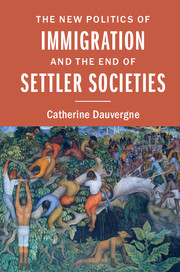4 - Fear of fundamental Islam
from PART 1 - THE END OF SETTLER SOCIETIES
Published online by Cambridge University Press: 05 March 2016
Summary
The terrorist attacks of 2001 unleashed a fear of Islamic fundamentalism in Western societies. This fear has freed Western politics from the uncomfortable constraints of cultural relativism, and has made it permissible – really – to prefer some cultures to others. There is some irony in the fact that liberalism itself allows, or even fosters, this preference, on the grounds that some cultures espouse “illiberal” values. This in turn leads to the loss of the liberal dream of immigration, which had served as a core underpinning of the settler society ethos. The true-or-not realization that some newcomers will not bend to the liberal values that are required or expected of immigrant communities is a long step from a focus on fundamentalism. But the two are often presented as inextricably linked. This ostensible linkage is at the heart of how the fear of Islamic fundamentalism becomes the second factor contributing to the end of settler societies. This chapter explores how this fear has both affected immigration regulation, and flowed outwards in all directions into a troubling Western acceptance of Islamic “culture” as unintelligible to liberalism.
The starting point in this analysis is to consider how “Islamophobia” has come to be understood as an artefact of mainstream Western popular and political culture. Following this, the chapter turns to an examination of two recent developments in immigration law which each relate – in distinct ways – to the fear of fundamental Islam. These developments are the security turn in immigration regulation and the immigration response to the practice of forced marriage. Comparing these two features of contemporary immigration law illustrates the distinction between fear of fundamentalism on the one hand, and consternation about illiberalism and unintelligibility on the other. These ideas merge in the final section, which demonstrates how the liberal underpinnings of settler societies have been deeply shaken by this recent cultural and political shift, in ways that make a return to the status quo ante impossible.
GROUND ZERO
The difference that the fear of fundamental Islam makes lies in the elision between this fear and what has been termed in Western popular culture, “Islamophobia.” Most liberal-minded, educated, human rights-respecting citizens of Western democracies are well aware that the percentage of the world's Muslim population that politically supports terrorist actions is minute, and that the number actually engaged in such acts in some way is even smaller.
- Type
- Chapter
- Information
- Publisher: Cambridge University PressPrint publication year: 2016



